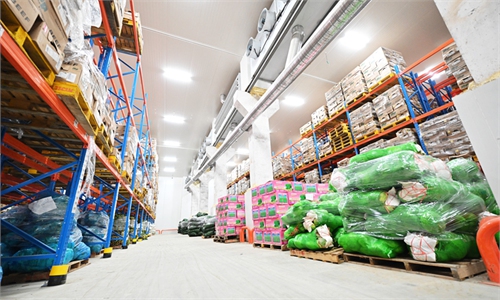China goes all out to address logistics disruptions caused by COVID-19
Ministry vows all efforts to ensure smooth transportation amid disruptions

A community worker wearing protective suit receives an item from a deliveryperson at the entrance of a sealed compound in Jing' an district in Shanghai on April 5, 2022. Photo: AFP
Chinese officials and the Ministry of Transport (MOT) have vowed to take all efforts to ensure smooth transportation of goods and secure supply chains, after various factors, including strict anti-epidemic measures for truck drivers in certain areas, caused serious disruptions to logistics and supply of production and living materials, drawing widespread attention.
During her recent inspection tour in Shanghai for epidemic control work, Vice Premier Sun Chunlan stressed that it is necessary to enhance the sense of urgency in transportation and supply chains, asking Shanghai to make breakthroughs in blockages of transportation and distribution as soon as possible.
The MOT also said on Saturday that it had convened a meeting on coordinating efforts to ensure logistics, noting that "one-size-fits-all" anti-epidemic measures for truck drivers in certain areas, including closure of services centers on some highways, have caused disruptions to transportation and logistics.
The meeting stressed the need to "go all out to ensure efficient and smooth freight logistics," while banning unauthorized measures to disrupt transportation, including highway services center closures, and asking local authorities to provide necessary services for truck drivers.
In the face of rising COVID-19 cases in Shanghai and the neighboring regions, some local governments announced a series of epidemic control measures, including the temporary suspension of some trans-city highways in a bid to tighten the potential epidemic spread risks.
Moreover, some parts of dozens of provinces and cities across the country stretching from East China's Jiangsu Province to Northeast China's Liaoning Province have also implemented certain anti-epidemic measures on highways, with the entrances or exits of some expressway toll stations temporarily closed.
Decisions on road closures by some local governments have posed rising challenges for cargo deliveries from factories and plantations to ports and warehouses, which is putting pressure on logistics companies to keep running while dealing with the disruptions.
A business manager surnamed Zhao with a cargo service company based in Shanghai told the Global Times on Sunday that while there is still adequate ability for cargo to be delivered between cities and provinces, it will require more time and costs.
According to Fuyoukache, a logistics service provider, since late February, due to factors such as the epidemic and rising oil prices, overall freight costs have increased by 5-8 percent, especially in regions such as the Yangtze River Delta, where the trade flows are relatively high.
To cut their losses, logistics companies are turning down some new orders, and readjusting freight rates by an additional 1,500 yuan ($236) per order, industry insiders said.
"The current business is just about 60 percent compared with ordinary days before the latest outbreak in Shanghai, while it needs to reach 90 percent to make profits," a manager surnamed Pan with a Ningbo-based logistics company told the Global Times on Sunday.
"Now we are coordinating with various factories to pick up goods at high-speed intersections so as to improve transportation efficiency, but this is more difficult in areas with tight transportation capacity, especially in Zhejiang Province, because there are not so many truck drivers these days," Pan said.
In the past week, the number of orders received by truck drivers has dropped by 7.6 percent year-on-year. In the Yangtze River Delta region with Shanghai as the center, the number has dropped by about 12 percent, according to media reports.
While operations at some major ports such as Shanghai and Ningbo remain largely smooth, ships often depart with fewer goods than they should have because of disruptions in goods deliveries to the port, Zhong Zhechao, founder of One Shipping, an international logistics service consulting company, told the Global Times on Sunday. Zhong said throughput will be hit as the result of the situation.
Such disruptions have also impacted supplies of daily necessities to residents in COVID-19-affected areas, including Shanghai.
However, industry insiders said the situation should be eased soon as governments are beefing up efforts to secure supply chains.
The recent signals from the government are very clear and there is a certain urge to ease the situation of the logistics industry, Zhong said.


